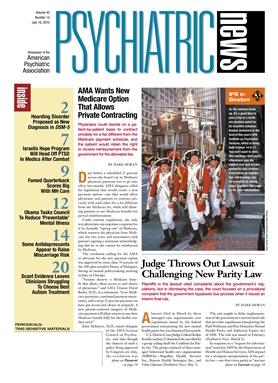Prevention of psychiatric illness was a key feature of President Obama's June 10 executive order creating a National Prevention, Health Promotion, and Public Health Council. Such an advisory group was authorized by the new health care reform law, known as the Patient Protection and Affordable Care Act.
The council will be composed of senior government officials from numerous departments and agencies and will be tasked with coordinating federal “health promotion” efforts and developing a national strategy to reduce “the incidence of preventable illness and disability.”
The council will receive input from an advisory council of up to 25 “licensed health professionals” who are experts in illness prevention.
The initiative has drawn interest from some mental health advocates because its objectives include the development of prevention strategies that focus, in part, on “mental health, behavioral health, [and] substance-use disorder[s].”
It's a focus long called for by many in the mental health field who view prevention and early intervention as a practical way to avoid or minimize the need for treatment of advanced psychiatric illness.
For example, “if care providers consistently screen and intervene with early-stage substance abuse, the health care system can avert enormous human and economic costs,” said A. Thomas McLellan, Ph.D., deputy director of the Office of National Drug Control Policy, in testimony before a House of Representatives subcommittee on June 23.
The need for increased mental illness prevention and early-detection efforts has also been acknowledged as critical by suicide-prevention advocates, who have stressed that the vast majority of suicide victims have untreated mental illness.
“We need to get better in recognizing the underlying psychological problems in vulnerable age groups,” Robert Gebbia, executive director of the American Foundation for Suicide Prevention, told Psychiatric News.
The federal initiative comes as efforts to prevent psychiatric illness have gained ground in recent years (Psychiatric News, January 1). Thomas Insel, M.D., director of the National Institute of Mental Health, highlighted the potential of “preemptive” schizophrenia treatment that targets individuals with risk factors such as family history combined with unusual thoughts and changes in social functioning. His comments came in a February 2009 editorial in the Archives of General Psychiatry.
Other new prevention initiatives include grants totaling $250 million authorized by the health care overhaul law to support prevention efforts specifically within the nation's public-health system, according to an announcement by Kathleen Sebelius, secretary of Health and Human Services (HHS), in June. The grants include $126 million to help integrate primary care services into publicly funded, community-based mental health facilities.
Professionals in the public mental health arena have long urged such integration, because many people with serious mental illness have co-occurring nonmental medical disorders, while people with serious nonmental health conditions are at risk of developing psychiatric conditions.
“Investing in proven preventive services will help patients get the care they need early, avoiding costly and unnecessary care later,” said Sebelius in a written statement. “This prevention-focused approach is better for doctors, patients, and our national balance sheet.”
The HHS grants also will provide $23 million to expand training in prevention-related care for those in the public-health workforce.
Such federal funding for prevention, detection, and early intervention of psychiatric illnesses among public-health workers is key, said McLellan, as is the new law's first-time requirement that private insurers also reimburse physicians for providing such activities.
